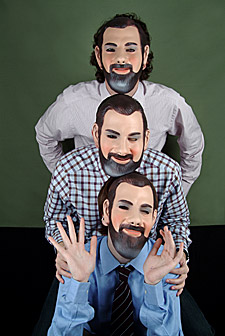 The emerging church seems to be the latest, hip, cool thing that everyone wants to talk about. Like all new things we need to look at it soberly, with sound theological judgment. We can't simply quote Luke 9:50 and be done with it. For many people would say they are on Jesus' side, but would deny substitutionary atonement or preach a broke-back Jesus who wears a dress, is nice to everyone and doesn't say he is God. However, we can't go the other way and read one book by a Canadian scholar living in Chicago and think that he has said the last word on a topic. For Canadians get things wrong too - like Celine Dion for example…
The emerging church seems to be the latest, hip, cool thing that everyone wants to talk about. Like all new things we need to look at it soberly, with sound theological judgment. We can't simply quote Luke 9:50 and be done with it. For many people would say they are on Jesus' side, but would deny substitutionary atonement or preach a broke-back Jesus who wears a dress, is nice to everyone and doesn't say he is God. However, we can't go the other way and read one book by a Canadian scholar living in Chicago and think that he has said the last word on a topic. For Canadians get things wrong too - like Celine Dion for example…
We need to recognize that talking about the emerging church is like talking about global Anglicanism, for just like global Anglicanism, there are many different theologies and ecclesiologies that lay claim to its title. So, for us to read one emerging author or hear of one emerging church service, and to give the impression that this author or service summarizes what the emerging church is about is like hearing Gene Robinson on homosexuality and saying "I now know what Anglicans think!" It’s poor research that proffers a ludicrous result.
In breaking down the emerging church, Missiologist Ed Stetzer has divided it into three broad groups called relevants, reconstructionists and revisionists.
Relevants: These guys tend to be theologically conservative but use different preaching, leading and worship styles in an effort to be more relevant to the world in which they live. Guys like Mark Driscoll, Dan Kimball and Rob Bell are relevants. For a slice of their theology and practice read the hilarious and brilliant book Reformission by Mark Driscoll.
Reconstructionists: These guys are frustrated with the modern day church styles (i.e. seeker sensitive and purpose driven). They seek to form house churches, which are small, informal, and can reflect more ancient ways of doing church. Aussies like Michael Frost and Alan Hirsch fit into this category. For an example of their theology and practice read the stimulating book by Frost and Hirsch The shaping of things to come.
Revisionists: These guys tend to be Theologically liberal and question a lot of biblical doctrines. They deny this saying "C'mon man, we are just having a conversation". But in their conversations they ask questions in such a way as to preclude certain answers and warrant others. This leads not to genuine conversation, but more often than not, a questioning of core biblical doctrines. Brian Mclaren and his sidekick Doug Padgitt are revisionists. To get a sense of this particular perspective read Mclaren's book A Generous Orthodoxy (which, by the way, is far too generous).
These three groups are all in the emerging church, for the emerging church wants to proclaim Jesus to the postmodern world. In this they are seeking to be a church that is truly missional. That is, they are seeking to engage with their culture, which means listening to the questions the world is asking so that they have an opportunity to answer them.
This listening can lead to different ways of doing church, preaching and engaging with the community. This is something we can definitely learn from because if we, as a diocese, are committed to seeing 10 percent of Sydney in Anglican churches we need to hear people who are reaching subcultures who are conspicuous by their absence in our churches. We need to think through clearly how to engage with the postmodern world because that is the world we are in. The emerging church will help us think through these issues.
My fear is that because there is a vocal minority in the emerging church who are theologically liberal we will not listen to those who have great things to say about reaching the people who go to make up our culture. We can't afford to write the whole movement off because its adherents are bringing relevant and provocative (if not always theologically conservative) answers to the question that all of us should be asking: "How can we best proclaim Jesus to the world we live in?'






















